中考英语词汇辨析
- 格式:ppt
- 大小:11.77 MB
- 文档页数:164
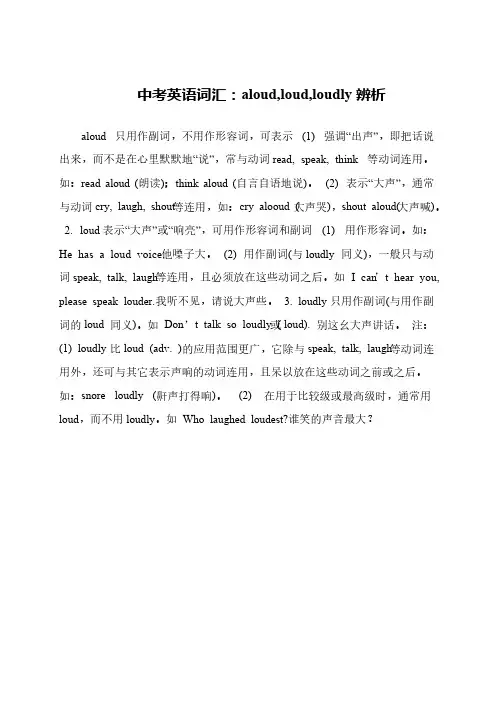
中考英语词汇:aloud,loud,loudly辨析
aloud 只用作副词,不用作形容词,可表示(1) 强调“出声”,即把话说出来,而不是在心里默默地“说”,常与动词read, speak, think 等动词连用。
如:read aloud (朗读);think aloud (自言自语地说)。
(2) 表示“大声”,通常
大声喊)。
与动词cry, laugh, shout等连用,如:
等连用,如:cry alooud (大声哭),shout aloud(大声喊2. loud表示“大声”或“响亮”,可用作形容词和副词(1) 用作形容词。
如:He has a loud voice. 他嗓子大。
(2) 用作副词(与loudly 同义),一般只与动词speak, talk, laugh等连用,且必须放在这些动词之后。
如I can’t hear you, please speak louder. 我听不见,请说大声些。
我听不见,请说大声些。
3. loudly 只用作副词(与用作副词的loud 同义)。
如Don’t talk so loudly (或loud). 别这幺大声讲话。
注:(1) loudly 比loud (adv. ) 的应用范围更广,它除与
的应用范围更广,它除与speak, talk, laugh等动词连用外,还可与其它表示声响的动词连用,且呆以放在这些动词之前或之后。
如:snore loudly (鼾声打得响)。
(2) 在用于比较级或最高级时,通常用loud,而不用loudly。
如Who laughed loudest? 谁笑的声音最大?
谁笑的声音最大?。
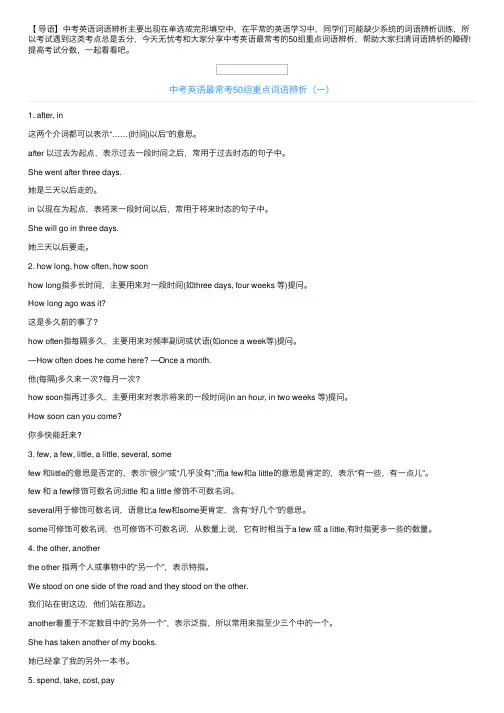
【导语】中考英语词语辨析主要出现在单选或完形填空中,在平常的英语学习中,同学们可能缺少系统的词语辨析训练,所以考试遇到这类考点总是丢分,今天⽆忧考和⼤家分享中考英语最常考的50组重点词语辨析,帮助⼤家扫清词语辨析的障碍!提⾼考试分数,⼀起看看吧。
中考英语最常考50组重点词语辨析(⼀)1. after, in这两个介词都可以表⽰“……(时间)以后”的意思。
after 以过去为起点,表⽰过去⼀段时间之后,常⽤于过去时态的句⼦中。
She went after three days.她是三天以后⾛的。
in 以现在为起点,表将来⼀段时间以后,常⽤于将来时态的句⼦中。
She will go in three days.她三天以后要⾛。
2. how long, how often, how soonhow long指多长时间,主要⽤来对⼀段时间(如three days, four weeks 等)提问。
How long ago was it?这是多久前的事了?how often指每隔多久,主要⽤来对频率副词或状语(如once a week等)提问。
—How often does he come here? —Once a month.他(每隔)多久来⼀次?每⽉⼀次?how soon指再过多久,主要⽤来对表⽰将来的⼀段时间(in an hour, in two weeks 等)提问。
How soon can you come?你多快能赶来?3. few, a few, little, a little, several, somefew 和little的意思是否定的,表⽰“很少”或“⼏乎没有”;⽽a few和a little的意思是肯定的,表⽰“有⼀些,有⼀点⼉”。
few 和 a few修饰可数名词;little 和 a little 修饰不可数名词。
several⽤于修饰可数名词,语意⽐a few和some更肯定,含有“好⼏个”的意思。
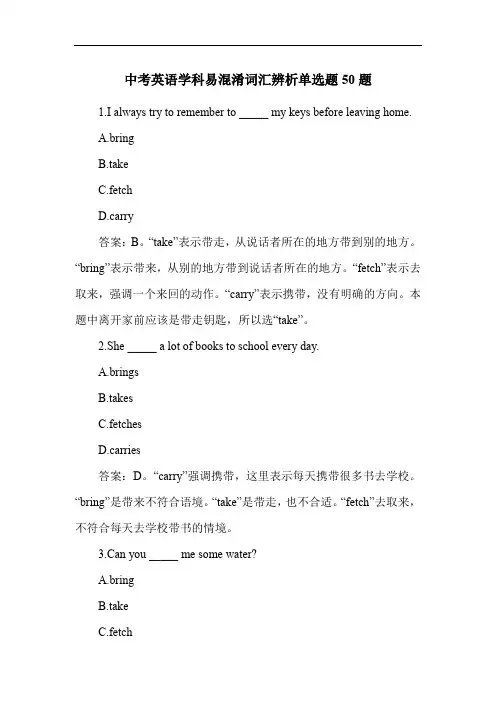
中考英语学科易混淆词汇辨析单选题50题1.I always try to remember to _____ my keys before leaving home.A.bringB.takeC.fetchD.carry答案:B。
“take”表示带走,从说话者所在的地方带到别的地方。
“bring”表示带来,从别的地方带到说话者所在的地方。
“fetch”表示去取来,强调一个来回的动作。
“carry”表示携带,没有明确的方向。
本题中离开家前应该是带走钥匙,所以选“take”。
2.She _____ a lot of books to school every day.A.bringsB.takesC.fetchesD.carries答案:D。
“carry”强调携带,这里表示每天携带很多书去学校。
“bring”是带来不符合语境。
“take”是带走,也不合适。
“fetch”去取来,不符合每天去学校带书的情境。
3.Can you _____ me some water?A.bringB.takeC.fetch答案:A。
“bring”表示带来,这里是让对方给自己带来一些水。
“take”带走不对。
“fetch”去取来,没有“bring”直接。
“carry”携带,不是此处的意思。
4.He went to the library to _____ a book.A.bringB.takeC.fetchD.carry答案:C。
“fetch”表示去取来,去图书馆取一本书符合这个意思。
“bring”带来,从图书馆的角度不是带来。
“take”带走,不太准确。
“carry”携带也不合适。
5.She _____ her baby in her arms.A.bringsB.takesC.fetchesD.carries答案:D。
“carry”表示携带,这里是她把宝宝抱在怀里,用“carry”合适。
“bring”带来不符合。
“take”带走不对。
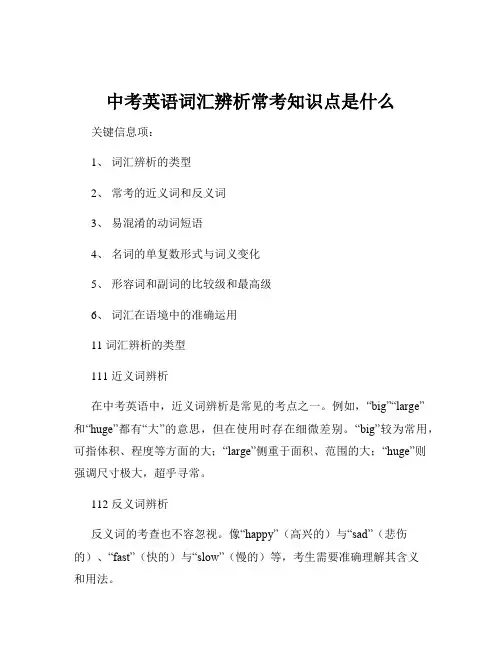
中考英语词汇辨析常考知识点是什么关键信息项:1、词汇辨析的类型2、常考的近义词和反义词3、易混淆的动词短语4、名词的单复数形式与词义变化5、形容词和副词的比较级和最高级6、词汇在语境中的准确运用11 词汇辨析的类型111 近义词辨析在中考英语中,近义词辨析是常见的考点之一。
例如,“big”“large”和“huge”都有“大”的意思,但在使用时存在细微差别。
“big”较为常用,可指体积、程度等方面的大;“large”侧重于面积、范围的大;“huge”则强调尺寸极大,超乎寻常。
112 反义词辨析反义词的考查也不容忽视。
像“happy”(高兴的)与“sad”(悲伤的)、“fast”(快的)与“slow”(慢的)等,考生需要准确理解其含义和用法。
113 形似词辨析一些词汇在拼写和发音上相似,但词义完全不同。
如“quite”(相当)和“quiet”(安静的),“accept”(接受)和“except”(除之外)。
12 常考的近义词和反义词121 常见的近义词“look”“see”“watch”都与“看”有关,但“look”强调看的动作,“see”侧重于看的结果,“watch”则常指观看活动、比赛等。
“spend”“cost”“take”“pay”都有“花费”之意,“spend”主语是人,“cost”主语是物,“take”通常用于“it takes sb some time to do sth”句型,“pay”常与“for”搭配。
122 常见的反义词“good”与“bad”、“right”与“wrong”、“many”与“few”、“much”与“little”等反义词在中考中经常出现,需要考生清晰掌握其用法和区别。
13 易混淆的动词短语131 由“put”构成的动词短语“put on”(穿上)、“put off”(推迟)、“put up”(张贴;举起)、“put away”(收拾好)等,这些短语的含义和用法各不相同。
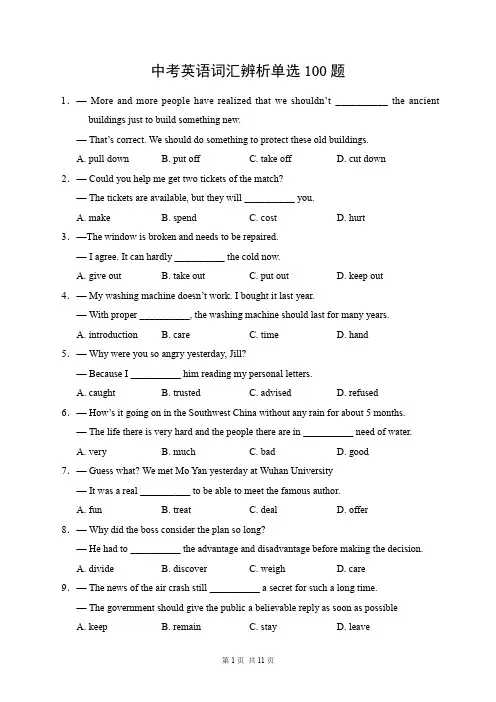
中考英语词汇辨析单选100题1.—More and more people have realized that we shouldn’t __________ the ancient buildings just to build something new.—That’s correct. We should do something to protect these old buildings.A. pull downB. put offC. take offD. cut down2.— Could you help me get two tickets of the match?— The tickets are available, but they will __________ you.A. makeB. spendC. costD. hurt3.—The window is broken and needs to be repaired.— I agree. It can hardly __________ the cold now.A. give outB. take outC. put outD. keep out4.—My washing machine doesn’t work. I bought it last year.— With proper __________, the washing machine should last for many years.A. introductionB. careC. timeD. hand5.— Why were you so angry yesterday, Jill?— Because I __________ him reading my personal letters.A. caughtB. trustedC. advisedD. refused 6.—How’s it going on in the Southwest China without any rain for about 5 months.— The life there is very hard and the people there are in __________ need of water.A. veryB. muchC. badD. good7.— Guess what? We met Mo Yan yesterday at Wuhan University— It was a real __________ to be able to meet the famous author.A. funB. treatC. dealD. offer8.— Why did the boss consider the plan so long?— He had to __________ the advantage and disadvantage before making the decision.A. divideB. discoverC. weighD. care9.— The news of the air crash still __________ a secret for such a long time.— The government should give the public a believable reply as soon as possibleA. keepB. remainC. stayD. leave10.— I hear Bob has gotten the pass to Wuhan University—That's great news for him. All his efforts have __________.A. worked outB. paid offC. taken in D turned off11.— The news says a little kid fell off the balcony of the building.— That's too horrible. Little kids should be kept within the __________ of parents.A. reachB. sightC. signD. notice12.It's wrong and dangerous to leave children under a(an) __________ age alone in the house.A. youngB. certainC. middleD. early13.— Further treatment will __________ cancer from developing worse.— And regular exercise can also help.A. protectB. escapeC. stopD. prevent14.I don't understand. Why did he leave his job in Beijing to __________ farming?A. take upB. set upC. turn upD. look up 15.Failure doesn’t _______ in not reaching your goal, but in not having a good goal to reach.A. checkB. disappearC. emptyD. lie16.— A car accident has happened, so what we have to wait?—Don’t worry. When the road is __________, I will drive you home.A. freeB. tidyC. lightD. clear17.— You know the woman well?— No. But her accent __________ that she was a native from Shanghai, my hometown.A. supposedB. suggestedC. requiredD. introduced18.— Why did David leave the company?— His talents are not fully ________ there.A. appreciatedB. shownC. spreadD. thanked19.— He likes to make __________ in the article where necessary.— I think it is a good way to learn.A. signsB. signalsC. marksD. symbols20.In the science class, I learned that ice, snow and steam are different __________ of water.A. fieldsB. kindsC. formsD. changes21.— What happened to John?— He caught a cold several days ago, but he __________ be fine since he has been taking medicine.A. canB. shouldC. mustD. could22.— How much will I pay for the meal?— Thirty dollars will __________ all you want to have.A. payB. coverC. costD. spend23.— What happened to you this morning?— The teacher asked me what my __________ was when I was late again.A. causeB. answerC. excuseD. meaning24.— Is there any bread at home?— __________. But there are some cakes.A. NothingB. NoneC. NeitherD. Either25.— Why don’t you get her a mobile phone?—No, that’s not __________ enough. Everyone will think of that. I want to give her a surprise.A. boringB. cheapC. personalD. creative 26.—What’s that movie about?—The two characters hated each other at first, but they __________ getting married.A. ended upB. put upC. called upD. got up27.— How did you like this painting?— I was interested in it, because something in it __________ the painter’s deep love for nature.A. expressedB. discussedC. expectedD. imagined28.— What a day! It looks like rain again. We can’t go hiking tomorrow.—Don’t worry. There clouds will __________ soon.A. liftB. clearC. passD. Last29.I’ll look into the matter as soon as possible. Just have a little __________.A. timeB. patienceC. waitD. rest30.He is a man of few words and it is hard to __________ his thoughts.A. seeB. tellC. readD. say31.—If Mr Cox keeps on working like that, he’ll __________ sooner or later.—I agree with you. He shouldn’t work so hard, but be careful of his health.A. give inB. give outC. give offD. give back 32.— Why did you come to discuss the question?— Because it was a question which was worth __________ consideration.A. nervousB. seriousC. anxiousD. strict33.He was __________ for ten years for stealing.A. put awayB. put downC. put onD. put up 34.Dinner is ready! Everyone, please __________ your chair up to the table.A. putB. drawC. setD. take35.— Cindy never eats the food that __________ and often pours it away.—But it’s really wasteful to do so.A. staysB. keepsC. remainsD. leaves36.—I can’t open the window.— Well , let me have a(an) __________.A. handB. openC. goD. kick37.— Do you like to go on the holiday in Hainan with me?—I’d love to, but I cannot __________ the time.A. collectB. spendC. affordD. wait38.— Jack used to give most of his money to people in trouble. How do you like him?— Some thinks he might be kind of __________. But more people are grateful to him.A. sillyB. unhappyC. afraidD. frustrating 39.— Did you pass the final exam?— Yes, except Roger. But he seems __________.A. upsetB. calmC. angryD. anxious40.— Look, there are some spots of mud (泥) on your trousers and your trousers look dirty.— I have tried to remove the spots of mud on my trousers but they will not __________.A. run awayB. get outC. go awayD. go out41.—What’s wrong with your mother?—She’s feeling under the __________, I have to send her to see a doctor.A. weatherB. troubleC. problemD. pain42.— How tidy the newspapers are!— I have one each day, then I read it and __________ it __________ here.A. put; outB. put; downC. put; awayD. put; off43.— Did Jim speak to you last week?— No, he __________ me, but he didn’t notice me.A. passedB. sawC. greetedD. knocked44.— What are you going to do?—I’m going to __________ the mistakes in my paper. M r. Li said I didn’t get all the answers correct.A. find outB. take outC. keep outD. look out45.— We need to __________ a time to have a talk now!— What about tomorrow? I am too busy today.A. put upB. fix upC. use upD. look up46.— I will buy you a new bike if you learn how to swim this summer.— Is that a __________? I am sure I’ll get the bike.A. chanceB. promiseC. trickD. treat47.— It’s nearly eleven. Jim is still playing computer games.— Will you __________ him to his bed?A. askB. callC. hurryD. catch48.—It’s our pleasure to do business with you.— The pleasure is mine. We’ll let you have the __________ next Wednesday at the latest.A. offerB. presentC. pointD. practice49.— What do you think of the dinner in Mr. Brown's?— Oh, great! We have never had a better one. It's a dinner of twenty __________.A. drinksB. peopleC. tablesD. courses50.— Markis the most popular person in our class.— So he is. __________ else is funnier than him.A. SomebodyB. EverybodyC. AnybodyD. Nobody51.I was __________ in the middle of my call because I had no more coins to put in the box.A. cut offB. broken inC. hung upD. put down 52.He’d been out celebrating and __________ his wife to drive him home.A. hopedB. expectedC. affordedD. offered53.— What a nice man he is!— Yes, I still remember my first __________ with him at the school gate.A. playB. noticeC. fightD. meeting54.— How far is the house!—Yes, it __________ on the top of the mountain.A. standsB. sticksC. coversD. grows55.He is a new comer here. All the food here doesn’t __________ him.A. agree withB. likeC. matchD. agree on56.— Chinese tennis player Li Na reached the final on January 24, 2013 in Australia.— Yeah, I watched the game that day and my spirits __________ at the news.A. roseB. calmedC. turnedD. shocked57.―Doug’s going to __________ some colorful lights for his birthday party.―In the small living room? That’s hard work.A. catch upB. fix upC. use upD. look up58.— Excuse me, may I ask you some questions?—Sorry, I’m too busy and haven’t even a minute to __________.A. spendB. spareC. shareD. stop59.To _________ nature is to help ourselves, or we will be punished.A. protectB. preventC. provideD. pollute60.— Could I do this job?—I’m afraid not. This job requires five years’ working __________.A. resultB. situationC. educationD. experience61.— I know the audience is not __________ so you must ask them to shorten the speech.— OK, I will.A. amazedB. seriousC. patientD. surprised 62.— You look anxious. What’s wrong with you?—I can’t work out the difficult math problem. Can you __________?A. hand me outB. carry me outC. help me outD. give me out 63.— Do you like reading books?— Yes, very much. Books can __________ me to the ocean of knowledge.A. makeB. remindC. leadD. cause64.We all know that learning a foreign language __________ time and effort.A. requiresB. reducesC. removesD. repeats65.— Life is hard these days.— At least we have some money left. That's __________, isn't it?A. everythingB. nothingC. somethingD. anything 66.— I asked my boss for a pay rise last week, but I was __________.— Oh, I am sorry to hear that.A. turned offB. turned downC. turned upD. turned over 67.— It has been raining for two weeks!— Let us hope the weather __________ before Saturday.A. controlsB. increasesC. risesD. improves 68.— Peter is ill in hospital.—I’m not __________ to hear that. I've been telling him not to work so late every day!A. surprisedB. sorryC. gladD. excited69.— How often did the boy watch TV?— He said that he watched TV every _________ day.A. anotherB. otherC. the secondD. three 70.—What should we do for the disabled children in the Children’s Home?—You’re supposed to __________ a study group to help them.A. take upB. fix upC. set upD. stay up71.— My _________ sank when I found I failed again.—You will surely be successful as long as you don’t give up practicing.A. thoughtsB. mindsC. spiritsD. brain72.— Why do we choose Tom instead of John?— He has an __________ over John, for he knows some French.A. newsB. helpC. advantageD. language 73.—How were you at John’s party?— Just so-so. I knew few guests __________.A. nowB. presentC. absentD. gifts74.— We all know the hoax is harmful to our school.— Good news always reaches us slowly, but bad news soon __________ everywhere.A. reportsB. getsC. spreadD. runs75.—We have been working for five hours. Let’s __________ for an hour.— Good idea. How about some music?A. get offB. turn offC. break offD. take off 76.— Hey, Nick, can you hang out with me on Monday night?— Sure! _________ you on Monday!A. CatchB. FollowC. MeetD. Miss 77.When I said this meal was my treat, a smile __________ up her face.A. spreadB. litC. spedD. appeared 78.— Shall we go to visit the famous haunted house?—Sorry, but I’m __________. I have to treat my baby sister for an illness.A. tricked upB. ended upC. tied upD. dressed up 79.— What do you think of John, your new workmate?— Pretty good, though he is still __________ to the job.A. ableB. sorryC. strangeD. surprised 80.—Don’t __________ your breath speaking to them. They never listen.— Maybe you are right.A. wasteB. spendC. takeD. hold81.—It’s very important for parents to have good behavior.—I think so. Parents’ good behavior is helpful to __________ children’s character.A. makeB. shapeC. showD. teach82.—Don’t ma ke yourself __________ by playing football too hard Kevin!—It doesn’t matter. Maybe we look alike.A. keep outB. turn outC. put outD. wear out 83.—Martin’s parents got very disappointed because he always failed his examinations.— What can you expect? He __________ with those who broke the school rules all the time.A. showed upB. mixed upC. met upD. stayed up84.— If you have any trouble, you can __________ me. I am glad to do you a favor.— I will. Thank you so much.A. botherB. treatC. reachD. touch85.—I don’t think you should play games at work. You can’t mix __________ with pleasure.—I’m sorry, I won’t do it again.A. businessB. planC. taskD. matter86.— Can I pay the bill by check?— Sorry, sir. But in our hotel, it __________ be paid by cash.A. mayB. mustC. willD. can87.As the two heads appeared in the sight, the group of people waiting on the top of the mountain went __________ with joy.A. deepB. hardC. excitingD. wild88.— Do you listen to the speech made by Professor Liu yesterday?—Yes, it’s very interesting. It __________ much useful information we students need.A. fillsB. likesC. coversD. spreads89.— When shall we leave for the party?—Let’s __________ it at 6:30.A. take B follow C. meet D. make90.— Have you finished the report?—No, I haven’t been __________ to read it all yet.A. ableB. busyC. willingD. ready91.I would __________ it if you would turn down the music.A. thankB. welcomeC. appreciateD. prefer 92.— How often do you write emails to your brother?— Only once a month. __________ of us has little time.A. BothB. NeitherC. NoneD. Either 93.— How is Miss Zhang Lili now?— Although she was badly hurt in the accident, she luckily stays __________.A. aliveB. healthyC. wellD. living 94.John was disappointed at not getting the job, but he’ll soon __________ it.A. get overB. get onC. get outD. get along 95.— I think the white shirt and the dark blue trousers should __________ very well.— Really? Let me try.A. matchB. meetC. fitD. suit 96.—What’s the matter?—I can’t stand the loud music here. It’s nearly __________ me mad.A. keepingB. turningC. givingD. driving 97.—What’s wrong with Lucy?— She s till hasn’t __________ the shock of her mother’s death.A. got outB. got throughC. got overD. got on 98.— Why do you always put this book in your backpack?— Because this book __________ my interest in the study of history.A. liftsB. raisesC. takesD. carries 99.— Why are you looking worried?— Oh, I'm out of work. But jobs are hard to __________ these days.A. come alongB. come byC. come outD. come on 100.— I'd like to be a rich man when I grow up.— That's a good dream, but don't let the desire for money _____ your life.A.getB. raiseC. ruleD. believe中考英语词汇辨析单选100题参考答案1~5 ACDBA 6~10 CBCBB 11~15 BBDAD 16~20 DBACC 21~25 DBCBD 26~30 AABCB 31~35 BBABC 36~40 CCCAB 41~45 ACAAB 46~50 DCADD 51~55 ABDAA 56~60 ABBAD 61~65 CCCAC 66~70 BDABC 71~75 CCBCC 76~80 ABCCA 81~85 BDBCA 86~90 BDBCA 91~95 CDAAA 96~100DCBBC第11页共11页。
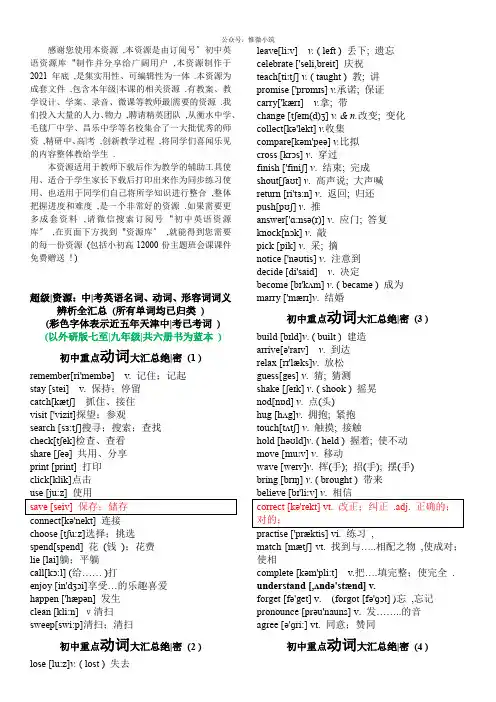
感谢您使用本资源,本资源是由订阅号〞初中英语资源库"制作并分享给广阔用户,本资源制作于2021年底,是集实用性、可编辑性为一体.本资源为成套文件,包含本年级|本课的相关资源.有教案、教学设计、学案、录音、微课等教师最|需要的资源.我们投入大量的人力、物力,聘请精英团队,从衡水中学、毛毯厂中学、昌乐中学等名校集合了一大批优秀的师资,精研中、高|考,创新教学过程,将同学们喜闻乐见的内容整体教给学生.本资源适用于教师下载后作为教学的辅助工具使用、适合于学生家长下载后打印出来作为同步练习使用、也适用于同学们自己将所学知识进行整合,整体把握进度和难度,是一个非常好的资源.如果需要更多成套资料,请微信搜索订阅号"初中英语资源库〞,在页面下方找到"资源库〞,就能得到您需要的每一份资源(包括小初高12000份主题班会课课件免费赠送! )超级|资源:中|考英语名词、动词、形容词词义辨析全汇总(所有单词均已归类) (彩色字体表示近五年天津中|考已考词)(以外研版七至|九年级|共六册书为蓝本)初中重点动词大汇总绝|密(1 ) remember[ri'membə] v. 记住;记起stay [stei] v. 保持;停留catch[kætʃ] 抓住、接住visit ['vizit]探望;参观search [sɜ:tʃ]搜寻;搜索;查找check[tʃek]检查、查看share [ʃeə] 共用、分享print [print] 打印click[klik]点击choose [tʃu:z]选择;挑选spend[spend] 花(钱);花费lie [lai]躺;平躺call[kɔ:l] (给…… )打enjoy [in'dʒɔi]享受…的乐趣喜爱happen ['hæpən] 发生clean [kli:n] v清扫sweep[swi:p]清扫;清扫初中重点动词大汇总绝|密(2 )lose [lu:z]v. ( lost ) 失去leave[li:v] v. ( left ) 丢下; 遗忘celebrate ['seli,breit] 庆祝teach[tiːtʃ] v. ( taught ) 教; 讲promise ['prɒmɪs] v.承诺; 保证carry['kærɪ] v.拿; 带change [tʃeɪn(d)ʒ] v. & n.改变; 变化collect[kə'lekt] v.收集compare[kəm'peə] v.比拟cross [krɔs] v. 穿过finish ['finiʃ] v. 结束; 完成shout[ʃaʊt] v. 高声说; 大声喊return [ri'tɜ:n] v. 返回; 归还push[pʊʃ] v. 推answer['ɑ:nsə(r)] v. 应门; 答复knock[nɔk] v. 敲pick [pik] v. 采; 摘notice ['nəʊtis] v. 注意到decide [di'said] v. 决定become [bɪ'kʌm] v. ( became ) 成为marry ['mærɪ]v. 结婚初中重点动词大汇总绝|密(3 )build [bɪld]v. ( built ) 建造arrive[ə'raɪv] v. 到达relax [rɪ'læks]v. 放松guess[ges] v. 猜; 猜测shake [ʃeɪk] v. ( shook ) 摇晃nod[nɒd] v. 点(头)hug [hʌg]v. 拥抱; 紧抱touch[tʌtʃ] v. 触摸; 接触hold [həʊld]v. ( held ) 握着; 使不动move [muːv] v. 移动wave [weɪv]v. 挥(手); 招(手); 摆(手)bring [brɪŋ] v. ( brought ) 带来match [mætʃ] vt. 找到与…..相配之物,使成对;使相complete [kəm'pli:t] v.把….填完整;使完全. understand [,ʌndə'stænd] v.forget [fə'get] v. (forgot [fə'ɡɔt] )忘,忘记pronounce [prəu'nauns] v. 发……..的音agree [ə'ɡri:] vt. 同意;赞同初中重点动词大汇总绝|密(4 )miss [mis] v. 未击中;未到达 book [buk] vt. 预订park [p ɑ:k] vt. 停放 (车 );泊 (车)cost [kɔst] vt. 花费;价钱为 .n. show [ʃəu] vt.allow [ə'lau] vt. 允许;准许raise [reiz] vt. 抚养;筹集 (钱款 );养育; set [set] v.设置;设定初中重点动词大汇总绝|密 (5 ) develop [di'veləp] v. 研制;制定feed [fi:d] vt. (fed [fed] )喂养;饲养 fall [f ɔ:l] vi. 下落;跌落follow ['f ɔl əu] vt. 跟随;紧跟 land [lænd] v. 降落appear [ə'piə] vi. 出现;显露 bite [bait] vt. (bi[biti] )咬;叮 climb [klaim] vi. 爬;攀爬 throw [θrəu] vt. 投;掷increase [in'kri:s] v.增大;增长 accept [ək'sept] v. 收受;接受 imagine [i'mædʒin] vi. 想像;设想 drop [drɔp] vt. 投下;使落下 cover ['kʌvə] v. 盖;盖上 warn [w ɔ:n] vt. 警告 ,告诫keep [ki:p] vt. (kept [kept] )保持;留在 enter ['entə(r)] (使 )参加; (使 )|报名初中重点动词大汇总绝|密 (6 )afford [ə'fɔ:d] v. (有财力 )买得起;付得起 invite [ɪn'vaɪt] 邀请move [mu:v] 搬家;改变…的位置send (sent )[send] 派遣去;命令…去 reach [ri:tʃ] 到达;抵达discover [dɪ'skʌvə(r)] 发现;找到communicate [kə'mju:nɪkeɪt] 联系;交流 cough [kɒf] 咳嗽(n.);咳嗽 (v. )fight [fa ɪt] v.与…战斗/n.战斗;斗争 satisfy [ˈsæt ɪsfa ɪ] 满足;使满意separate ['sepr ət] v.使分开;分隔 explain [ɪk'sple ɪn] 解释;说明 refuse [r ɪ'fju:z] 拒绝| regret [r ɪ'ɡret] 懊悔;遗憾初中重点动词大汇总绝|密(7 ) avoid [ə'v ɔɪd] 防止;防止 remain [rɪˈmeɪn] v. 逗留 ,留下 grow [grəʊ] v. 种植 ,栽培(植物) lay (laid, laid)[leɪ] v.摆放(餐桌)attend[əˈtend] v. 上(学) ,出席 ,参加(事件或活动)treat [tri:t] v. 医治 ,治疗realise['rɪəlaɪz] v. 了解 ,意识到manage[ˈmænɪdʒ]v. 做成 ,(尤指)设法完成 continue[kənˈtɪnju: ] v. (使)继续 punish [ˈpʌnɪʃ] v. 惩罚 ,惩办 consider [kənˈsɪdə]v. 考虑 ,斟酌 control [kənˈtrəʊl]v. 操作 ,操纵 dig (dug, dug)[dɪg]v. 挖掘 ,掘(洞) discuss [dɪˈskʌs]v. 讨论 ,谈论influence[ˈɪnfluəns] v. 影响 ,作用于suppose [səˈpəʊz]v. 猜测 ,推测 ,相信 ,认为 escape [ɪˈskeɪp] v. 逃离 ,逃脱初中重点动词大汇总绝|密(8 )result[rɪˈzʌlt] v. (因…而)产生,发生spread (spread, spread)v. 扩展,蔓延,传播store[stɔ:] v. 存储,储藏replace[rɪˈpleɪs] v. 替换,取代brush[brʌʃ] v. (用刷子)刷present[ˈpreznt] v. 授予,呈递pollute[pəˈlu:t]v. 污染recycle[ˌri:ˈsaɪkl] v. 回收利用,再使用(废品) reuse[ˌri:ˈju:z] v. 再次使用,重复利用divide[dɪˈvaɪd] v. 分开repeat[rɪˈpi:t] v. 重说,重新做succeed/səkˈsi:d/v.成功;做成starve/stɑ:v/v.挨饿;饿死expect/ɪkˈspekt/v.预料;预计require/rɪˈkwaɪə/v.需要harm/hɑ:m/v.损害;伤害serve/sɜ:v/v.端上(食物和饮料);伺候……进餐intend/ɪ nˈtend/v.方案;打算achieve/əˈtʃi:v/v.成功;实现初中重点抽象名词大汇总绝|密(1 ) grade [greid] n.年级|capital ['kæpit(ə)l] n.首|都;省会theatre ['θiətə] n 剧院family['fæmili; -m(ə)l -] n.家,家庭science['saiəns] n.科学;科学课room[ru:m; rʊm] n.房间;室;屋子subject['sʌbdʒikt]科目maths[mæθs]数学geography [dʒi'ɒgrəfi]地理history ['hist(ə)ri] 历史art[ɑ:t] 美术;艺术break [breik] (课间)休息kitchen ['kitʃin; -tʃən]厨房country ['kʌntri] 国|家internet ['intənet] 因特网customer['kʌstəmə]顾客company['kʌmpəni]公司;剧团document['dɒkjʊmənt] 文件information [infə'meiʃn] 信息secret ['si:krit]秘密初中重点抽象名词大汇总绝|密(2 ) magazine [,mægə'zi:n]杂志exercise['eksə,saiz] 锻炼;练习moment ['məʊmənt]的时刻,时候festival ['festivl] 节日programme['prəʊgræm]节目term[tɜːm] n.学期board[bɔːd] n.布告板country['kʌntrɪ] n.乡下; 乡村sightseeing ['saɪtsiːɪŋ] n.观光; 游览machine[mə'ʃiːn] n.机器space[speɪs] n.太空; 空间traffic['træfɪk] n.交通market['mɑːkɪt] n.市场sale[seɪl] n.降价出售price[praɪs] n.价格advantage [əd'vɑːntɪdʒ] n.优势product ['prɒdʌkt]n.产品tourist ['tʊərist] n.游客square[skweə(r)] n.广场初中重点抽象名词大汇总绝|密(3 ) village['vɪlɪdʒ] n.村庄store [stɔː] n. 商店president ['prezɪd(ə)nt]n. 总统language ['læŋgwɪdʒ] n. 语言fire ['faɪə] n.火; 火灾poem ['pəʊɪm] n.诗歌spelling ['speliŋ] n. 拼写;拼字sentence ['sentəns] n. 句子dictionary ['dikʃənəri] n. 字典;词典grammar ['ɡræmə] n. 语法letter ['letə] n. 信;字母mistake [mi'steik] n. 错误;过错vocabulary [vəu'kæbjuləri] n. 词汇pronunciation [prəu,nʌnsi'eiʃən] n. 发音advice [əd'vais] n. 建议;意见century ['sentʃʊrɪ] n. 世纪composer [kəm'pəʊzə] n. 作曲家century ['sentʃʊrɪ] n. 世纪composer [kəm'pəʊzə] n. 作曲家conversation [,kɔnvə'seiʃən] n. 交谈初中重点抽象名词大汇总绝|密(4 ) population [,pɔpju'leiʃən] n.人口university [,ju:ni'və:səti] n. 大学mountain [`mauntin] n. 山;山岳countryside ['kʌntri,said] n. 农村地区,umbrella [ʌm'brelə] n. 雨伞matter ['mætə] n.问题;麻烦practice ['præktis] n. 练习danger ['deindʒə] n. 危险;危害society [sə'saiəti] n. 社会journey ['dʒə:ni] n. 旅行;旅程accident ['æksidənt] n. 交通事故chance [tʃɑ:ns] n. 时机,可能性peace [pi:s] n. 和平;太平notice ['nəutis] n. 告示,布告situation [,sitju'eiʃən] n. 情况;形势research [ri'sə:tʃ] n. 研究;探讨scientist ['saiəntist] n. 科学家government ['ɡʌvənmənt] n. 政府nature ['neitʃə] n. 大自然;自然界symbol ['simbəl] n. 象征;标志初中重点抽象名词大汇总绝|密(5 ) pocket ['pɔkit] n. 口袋;衣袋medicine ['medisin] n. 药;药物degree [di'ɡri:] n. 度数;度service ['sə:vis] n. 效劳,公共效劳difference ['difərəns] n. 差异;差异surprise [sə'praiz] n. 惊奇;意外之事. tradition [trə'diʃən] n. 传统习俗example [iɡ'zɑ:mpl] n. 例子;实例experience [ik'spiəriəns] n. 经验;经历stairs [steəz] n. 楼梯;梯级|trouble ['trʌbl] n. 麻烦;烦恼;困难power [pauə] n. 电力competition[ˌkɒmpəˈtɪʃn]比赛;竞争mark [mɑ:k]分数hobby ['hɒbɪ]业余爱好message ['mesɪdʒ]口信;信息favourite['feɪvərɪt]最|喜欢的人或事planet ['plænɪt]行星project [prəˈdʒekt]方案;工程;工程environment [ɪn'vaɪrənmənt]环境初中重点抽象名词大汇总绝|密(6 ) solar ['səʊlə(r)]太阳的system ['sɪstəm]系统;体系group [ɡru:p]群;组universe [ˈju:nɪvɜ:s]宇宙galaxy ['ɡæləksɪ]星系communicate [kə'mju:nɪkeɪt]联系;交流member [ˈmembə(r)]成员;会员condition[kənˈdɪʃn]状况;身体状况fight [faɪt]v.与…战斗/n.战斗;斗争shelf [ʃelf]隔板;架子activity [æk'tɪvətɪ]活动skill [skɪl]技能;技艺value ['vælju:]价值;有用性success [sək'ses]成功;成就pleasure ['pleʒə(r)]愉悦;快乐weight [weɪt]重量guest [ɡest]客人;宾客form [fɔ:m]v.形成;n.表格friendship ['frendʃɪp]友谊;友好square [skweə(r)]平方的初中重点抽象名词大汇总绝|密(7 ) shape [ʃeɪp]外形;形状path [pɑ:θ]小路;路径mention ['menʃn]提及;谈到article ['ɑ:tɪkl]文章;|报道presenter [prɪˈzentə(r)]主持人background [ˈbækgraʊnd]背景;后景suggestion [səˈdʒestʃən]提议;建议treasure ['treʒə(r)]珍宝;珍贵之物weight [weɪt]重量guest [ɡest]客人;宾客form [fɔ:m]v.形成;n.表格friendship ['frendʃɪp]友谊;友好初中重点形容词大汇总绝|密(1 ) right[rait] adj. 正确的,对的sweet [swi:t] adj. 甜的bad [bæd] adj.坏的;不好的healthy ['helθi] adj.健康的delicious [di'liʃəs] adj.美味的tired[taiəd] adj. 劳累的important [im'pɔ:t(ə)nt] adj. 重要的difficult['difik(ə)lt] 困难的,难懂的interesting ['intrəstiŋ]有趣的busy['bizi] 忙的繁忙的different['difrənt] 不同的dangerous['deindʒərəs] 危险的cute[kju:t] 可爱的funny['fʌni] 有趣的little ['litl] 极少量的large[lɑ:dʒ]大的、巨大的strong[strɒŋ] 强壮的、强大的;强烈的great [greit]太好了;巨大的;超乎寻常的special ['speʃl]特别的,特殊的happy ['hæpi]快乐的,幸福的初中重点形容词大汇总绝|密(2 ) expensive [ik'spensiv]昂贵的afraid [ə'freid]担忧的害怕的ready['redi]有准备的;准备好的beautiful['bju:təfl]漂亮的,美丽的hard[hɑ:d] adv. 努力地careful ['kεəful] adj.仔细的; 认真的; 小心的strange [streindʒ] adj.奇怪的lucky ['lʌki] 幸运的merry ['meri] 愉快的;快乐的traditional [trə'diʃnəl] 传统的fit [fɪt] adj.健康的;强健的tidy ['taɪdɪ]adj.整齐的; 整洁的; 爱整洁的beautiful['bjuːtɪfʊl; -f(ə)l] adj.美的; 美丽的free [friː] adj. (时间)空闲的; 空余的true [truː] adj.真的; 真实的cheap [tʃiːp] adj.廉价的fresh[freʃ] adj.新鲜的safe[seɪf] adj. 平安的several ['sev(ə)r(ə)l]adj.几个; 一些online [ɒn'laɪn] adj.在线的初中重点形容词大汇总绝|密(3 ) famous['feiməs] adj. 著名的clear[kliə(r)] adj. (天气)晴朗的high [hai] adj. 高的strict [strɪkt] adj. 严格的; 严厉的born [bɔːn] adj. (动词bear的过去分词)出生nice [naɪs] adj. 友好的; 亲切的good [gʊd] adj. 乖的; 守规矩的difficult ['dɪfɪk(ə)lt]adj. 难对付的bored [bɔːd]adj. 厌烦的; 厌倦的last adj. (星期、月份等)最|近过去的,紧接现在前面的lost [lɒst] a dj. 迷路的hungry ['hʌŋgri] adj. 感到饿的; 饥饿的right [rait] adj. 适宜的; 恰当的asleep[ə'sli:p] adj. 睡着的real [riːl]adj.真实的; 真正的exact[ɪg'zækt; eg -] adj. 准确的; 确切的successful [sək'sesfʊl; -f(ə)l] adj. 成功的rich [rɪtʃ] adj. 富有的young [jʌŋ]adj. 年轻的world -famous adj. 举世闻名的初中重点形容词大汇总绝|密(4 ) wonderful ['wʌndəfʊl; -f(ə)l]adj. 绝|妙的; 了不起的rude[ruːd] adj. 粗鲁的; 无礼的polite [pə'laɪt] adj. 礼貌的foreign['fɒrɪn] adj. 外国的personal['pɜːs(ə)n(ə)l] adj. 个人的lively ['laɪvlɪ] adj. 活泼的; 轻快的modern ['mɒd(ə)n] adj. 现代的noisy['nɒɪzɪ] adj. 吵闹的western ['west(ə)n]adj. 西方的possible ['pɔsəbl] adj. 可能的natural ['nætʃərəl] adj. 合理的;符合常情的main [mein] adj. 主要的,最|大的excellent ['eksələnt] adj. 极好的;极好的poor [pɔː; pʊə] adj. 贫穷的perfect ['pɜːfɪkt] adj. 完美的classical ['klæsɪk(ə)l]adj. 经典的; 古典的boring ['bɔ:riŋ] adj. 无聊的;烦人的exciting [ik'saitiŋ] adj.使人兴奋的;令人冲动的relaxing [ri'læksiŋ] adj. 令人愉悦的;使人轻松的enjoyable [in'dʒɔiəbl] adj. 有乐趣的;令人愉快的初中重点形容词大汇总绝|密(5 ) careless ['kεəlis] adj. 粗心的;疏忽的common ['kɔmən] adj. 普通的;一般的close [kləuz] adj. (距离上)近点,接近的crowded ['kraudid] adj. 拥挤的;人数过多的confident ['kɔnfidənt] adj. 自信的pleased [pli:zd] adj. 开心的;满足的usual ['ju:ʒuəl] adj. 通常的,平常的magic ['mædʒik] adj.魔术的;戏法的thin [θin] adj. 细长的;瘦的interested ['intristid] adj. 关心的,感兴趣的wild [waild] adj. 野生的;n.野生环境enough [i'nʌf] adj. 充分的;足够的quiet ['kwaiət] adj. 安静的;寂静的local ['ləukəl] adj. 当地的;本地的public ['pʌblik] adj. 公众的;公共的terrible ['terəbl] adj. 可怕的;使人烦恼的broken ['brəukən] adj. 破碎的serious ['siəriəs] adj. 认真严肃的;不开玩笑的medical ['medikəl] adj. 医学的;医疗的初中重点形容词大汇总绝|密(6 ) harmful ['hɑ:mful] adj. 有害的clear [kliə] adj. 不和….接触的;不挨….太近的;v. 清calm [kɑ:m] adj. 镇静的,沉着的brave [breiv] adj. 勇敢的;无畏的helpful ['helpful] adj. 提供帮助的;有用的ancient ['eɪnʃənt]古老的;古代的pretty ['prɪtɪ]秀丽的;标致的nervous ['nə:vəs]情绪不安的;紧张的latest [ˈleɪtɪst]最|近的;最|新的solar ['səʊlə(r)]太阳的;与太阳有关的impossible [ɪmˈpɒsəbl]不可能的ugly ['ʌɡlɪ]难看的;丑陋的handsome ['hænsəm]漂亮的;英俊的smart [smɑ:t]机灵的;聪明的awful [ˈɔ:fl]极讨厌的;极坏的daily ['deɪlɪ]每天的;天天的weak[wi:k]弱的;虚弱的sleepy['sli:pɪ]想睡的;困的active [ˈæktɪv]积极的;活泼的初中重点形容词大汇总绝|密(7 ) clever ['klevə(r)]聪明的;机灵的thirsty ['θɜ:stɪ]渴的certain [ˈsə:tn]确定的;无疑的total ['təʊtl]总的;全部的crazy ['kreɪzɪ]发疯的;荒唐的own [əʊn]自己的private ['praɪvət]私人的;个人的valuable [ˈvæljuəbl]值钱的;有价值的patient ['peɪʃnt]有耐心的;能忍耐的bright [braɪt]欢快的;明亮的national ['næʃnəl]国|家的;国内的international[ˌɪntə'næʃnəl]国际的;世|界的loud [laʊd] adj. (声音)响亮的silent[ˈsaɪlənt] adj. 寂静的silver[ˈsɪlvə] adj. 银灰色的,银制的simple [ˈsɪmpl] adj. 简单的,容易的useful[ˈju:sfl] adj. 有用的,有益的dying[ˈdaɪɪŋ] adj. 垂死的,即将死亡的amazing[əˈmeɪzɪŋ] adj. 惊人的,极好的empty[ˈempti] adj. 空的初中重点形容词大汇总绝|密(8 ) unable[ʌnˈeɪbl] adj. 不能做某事的missing[ˈmɪsɪŋ]adj. 找不到的,失踪的honest [ˈɒnɪst] adj. 老实的,老实的necessary[ˈnesəsəri] adj. 必要的,必需的musical[ˈmju:zɪkl]adj. 音乐的wise[waɪz]adj. 有判断力的,明智的well -known['wel'nəʊn] adj.众所周知的,著名的surprised[səˈpraɪzd] adj. 惊奇的,惊讶的alive[əˈlaɪv]adj. 活着的fair[feə] adj. 公平的,合理的powerful[ˈpaʊəfl] adj. 有影响力的,能控制他人的electronic[ɪˌlekˈtrɒnɪk] adj.电子的varied[ˈveərid] adj. 各种各样的,各不相同的single[ˈsɪŋgl]adj. 仅一个的,单个的central[ˈsentrəl]adj. 中|心的,在中间的magical[ˈmædʒɪkl] adj. 神奇的,迷人的hopeless[ˈhəʊpləs] adj. 无望的general[ˈdʒenrəl]adj. 整体的,普遍的lazy[ˈleɪzi] adj. 懒惰的,懒散的rapid[ˈræpɪd] adj. 快速的,迅速的初中重点形容词大汇总绝|密(9 ) man -made[ˈmænˈmed] adj. 人造的natural[ˈnætʃrəl] adj. 大自然的stupid /ˈstju:pɪd/adj.笨的;糊涂的absent/ˈæbsənt/adj.缺席的;不在的wealthy/ˈwelθi/adj.富有的;富裕的spare/speə/adj.空余的;备用的tiny/ˈtaɪni/adj.微小的;极小的proper/ˈprɒpə/adj.适宜的,适当的straight/streɪt/adj.直的;笔直的sudden/ˈsʌdn/adj.突然的;急剧的soft/sɒft/adj.软的;柔软的still /stɪl/adj.静止的;不动的physical/ˈfɪzɪkl/adj.身体的;体力的similar/ˈsɪmələ/adj.相似的cross/krɒs/adj.生气的disappointed /ˌdɪsəˈpɔɪntɪd/adj.失望的;沮丧的present 出席excited 令人兴奋的副词词义辨析finally ['fainəli]最|后always ['ɔ:lweiz] 总是;一直quite[kwait]十分;相当fast [fɑːst] adv.快地;快速地else[els] adv.其他; 另外maybe ['meɪbiː; -bɪ] adv.也许early ['ɜːlɪ] adv.早; 提前certainly['sɜːt(ə)nlɪ; -tɪn -] adv.当然; 行almost ['ɔːlməʊst]adv.几乎; 差不多together [tə'geðə]adv. 一起; 共同pretty ['priti] adv. 相当地,非常,很quickly ['kwikli] adv. 迅速地;快地loudly ['laudli] adv. 大声地,响亮地round [raund] adv. 围绕地immediately [i'mi:diətli] adv. 立即,立刻nearly [ˈnɪəli] adv. 几乎,差不多simply[ˈsɪmpli] adv. 实在,确实actually [ˈæktʃuəli] adv. 事实上properly[ˈprɒpəli] adv. 适宜地,正确地mainly [ˈmeɪnli] adv. 大局部地,主要地recently[ˈri:sntli] adv. 最|近,近来direct /dɪˈrekt/ adv.径直地;直接地exactly /ɪgˈzæktli/ adv.确切地;完全;/口/ (表示fairly /ˈfeəli/ adv.相当;还算。
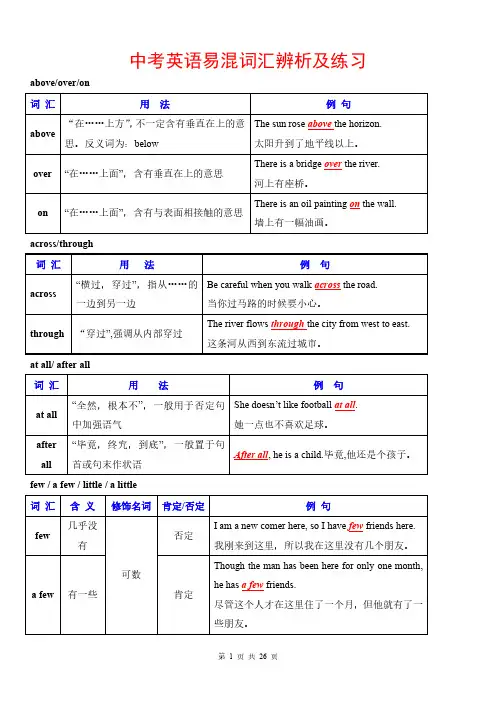
中考英语易混词汇辨析及练习above/over/on词汇用法例句above “在……上方”,不一定含有垂直在上的意思。
反义词为:belowThe sun rose above the horizon.太阳升到了地平线以上。
over“在……上面”,含有垂直在上的意思There is a bridge over the river.河上有座桥。
on“在……上面”,含有与表面相接触的意思There is an oil painting on the wall.墙上有一幅油画。
across/through词汇用法例句across “横过,穿过”,指从……的一边到另一边Be careful when you walk across the road.当你过马路的时候要小心。
through“穿过”,强调从内部穿过The river flows through the city from west to east.这条河从西到东流过城市。
at all/after all词汇用法例句at all “全然,根本不”,一般用于否定句中加强语气She doesn’t like football at all.她一点也不喜欢足球。
after all “毕竟,终究,到底”,一般置于句首或句末作状语After all,he is a child.毕竟,他还是个孩子。
few/a few/little/a little词汇含义修饰名词肯定/否定例句few 几乎没有可数否定I am a new comer here,so I have few friends here.我刚来到这里,所以我在这里没有几个朋友。
a few有一些肯定Though the man has been here for only one month, he has a few friends.尽管这个人才在这里住了一个月,但他就有了一些朋友。
little 几乎没有不可数否定There is little water in the glass,so you can’t drinkany.杯子里几乎没有水了,你不可能喝到水了。
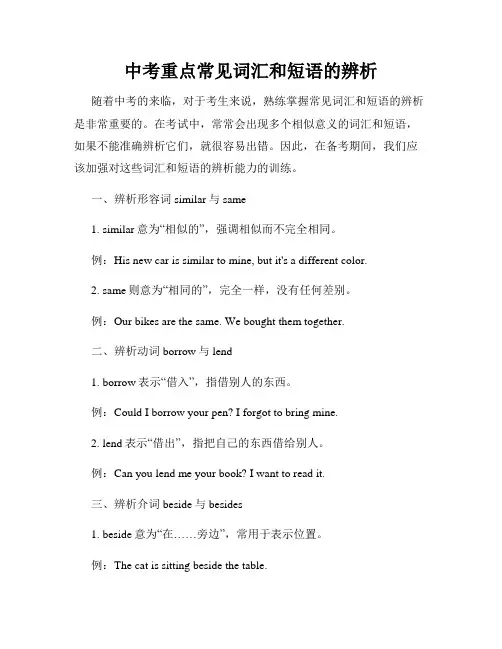
中考重点常见词汇和短语的辨析随着中考的来临,对于考生来说,熟练掌握常见词汇和短语的辨析是非常重要的。
在考试中,常常会出现多个相似意义的词汇和短语,如果不能准确辨析它们,就很容易出错。
因此,在备考期间,我们应该加强对这些词汇和短语的辨析能力的训练。
一、辨析形容词similar与same1. similar意为“相似的”,强调相似而不完全相同。
例:His new car is similar to mine, but it's a different color.2. same则意为“相同的”,完全一样,没有任何差别。
例:Our bikes are the same. We bought them together.二、辨析动词borrow与lend1. borrow表示“借入”,指借别人的东西。
例:Could I borrow your pen? I forgot to bring mine.2. lend表示“借出”,指把自己的东西借给别人。
例:Can you lend me your book? I want to read it.三、辨析介词beside与besides1. beside意为“在……旁边”,常用于表示位置。
例:The cat is sitting beside the table.2. besides意为“除了……之外”,常用于表示除了某事物或某人之外还有其他的事物或人。
例:Besides apples, we also have oranges.四、辨析动词learn与teach1. learn表示“学习”,指通过努力和训练获取新的知识或技能。
例:I learn English every day.2. teach表示“教”,指教授知识或技能给他人。
例:She teaches us math every Monday.五、辨析连词unless与if1. unless意为“除非”,相当于if not。
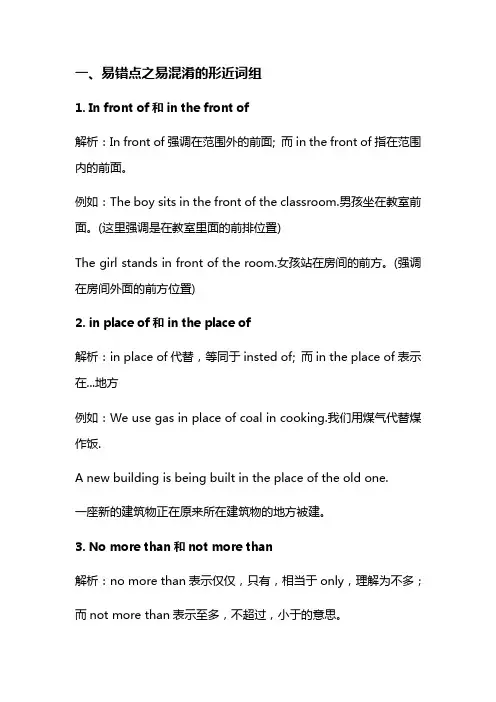
一、易错点之易混淆的形近词组1.In front of和in the front of解析:In front of强调在范围外的前面; 而in the front of指在范围内的前面。
例如:The boy sits in the front of the classroom.男孩坐在教室前面。
(这里强调是在教室里面的前排位置)The girl stands in front of the room.女孩站在房间的前方。
(强调在房间外面的前方位置)2.in place of和in the place of解析:in place of代替,等同于insted of; 而in the place of表示在...地方例如:We use gas in place of coal in cooking.我们用煤气代替煤作饭.A new building is being built in the place of the old one.一座新的建筑物正在原来所在建筑物的地方被建。
3.No more than和not more than解析:no more than表示仅仅,只有,相当于only,理解为不多;而not more than表示至多,不超过,小于的意思。
例如:He is no more than an ordinary English teacher. 他只不过是个普通的英文老师。
He has not more than three children. 他最多3 个孩子(有或许还不到三个)4.On earth和on the earth解析:两者都有在地上,在地球上的意思,但on earth还有到底,究竟的意思;On the earth只是单纯的表示在地上,在地球上例如:where on earth did you spring from?你究竟从哪里冒出来的?What if there was no lead on the earth at all?如果地球上根本就没有铅这种物质怎么办?5.At all和after all解析:at all表示根本,全然的意思,常用短语not at all表示一点也不;after all表示到底,毕竟的意思例如:I don't know him at all. 我根本不认识他。
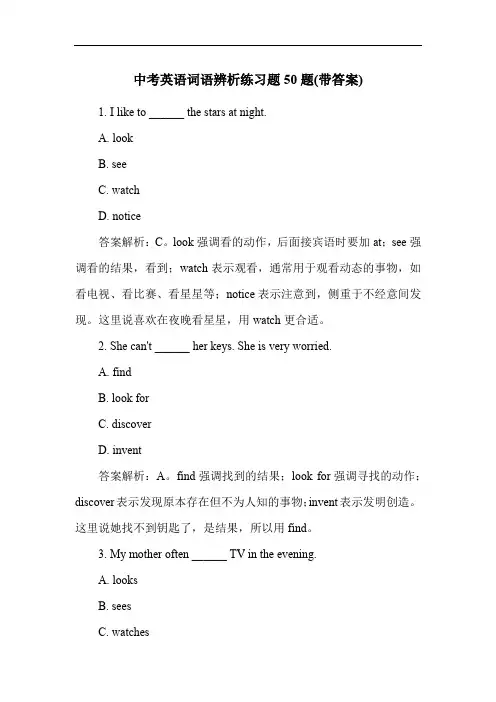
中考英语词语辨析练习题50题(带答案)1. I like to ______ the stars at night.A. lookB. seeC. watchD. notice答案解析:C。
look强调看的动作,后面接宾语时要加at;see强调看的结果,看到;watch表示观看,通常用于观看动态的事物,如看电视、看比赛、看星星等;notice表示注意到,侧重于不经意间发现。
这里说喜欢在夜晚看星星,用watch更合适。
2. She can't ______ her keys. She is very worried.A. findB. look forC. discoverD. invent答案解析:A。
find强调找到的结果;look for强调寻找的动作;discover表示发现原本存在但不为人知的事物;invent表示发明创造。
这里说她找不到钥匙了,是结果,所以用find。
3. My mother often ______ TV in the evening.A. looksB. seesC. watches答案解析:C。
watch TV是固定搭配,表示看电视。
look后面需加at再接宾语;see强调看的结果,通常不用于表示看电视;view更侧重于看待、观察的意思,不用于看电视这个表达。
4. The little boy ______ a strange man in the park yesterday.A. lookedB. sawC. watchedD. stared答案解析:B。
yesterday表明是过去的事情,这里强调看到了一个奇怪的男人这个结果,所以用saw。
look强调动作;watch侧重于观看动态事物;stare表示凝视,通常带有不礼貌的意味,在这里不符合语境。
5. I ______ around but found nothing.A. lookedB. sawC. watchedD. noticed答案解析:A。
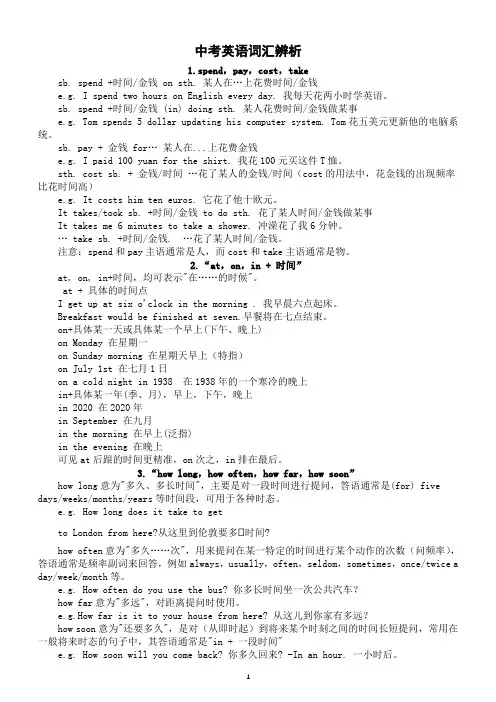
中考英语词汇辨析1.spend,pay,cost,takesb. spend +时间/金钱 on sth. 某人在…上花费时间/金钱e.g. I spend two hours on English every day. 我每天花两小时学英语。
sb. spend +时间/金钱 (in) doing sth. 某人花费时间/金钱做某事e.g. Tom spends 5 dollar updating his computer system. Tom花五美元更新他的电脑系统。
sb. pay + 金钱 for…某人在...上花费金钱e.g. I paid 100 yuan for the shirt. 我花100元买这件T恤。
sth. cost sb. + 金钱/时间…花了某人的金钱/时间(cost的用法中,花金钱的出现频率比花时间高)e.g. It costs him ten euros. 它花了他十欧元。
It takes/took sb. +时间/金钱 to do sth. 花了某人时间/金钱做某事It takes me 6 minutes to take a shower. 冲澡花了我6分钟。
… take sb. +时间/金钱. …花了某人时间/金钱。
注意:spend和pay主语通常是人,而cost和take主语通常是物。
2.“at,on,in + 时间”at, on, in+时间,均可表示"在……的时候"。
at + 具体的时间点I get up at six o'clock in the morning . 我早晨六点起床。
Breakfast would be finished at seven.早餐将在七点结束。
on+具体某一天或具体某一个早上(下午、晚上)on Monday 在星期一on Sunday morning 在星期天早上(特指)on July 1st 在七月1日on a cold night in 1938 在1938年的一个寒冷的晚上in+具体某一年(季、月),早上,下午,晚上in 2020 在2020年in September 在九月in the morning 在早上(泛指)in the evening 在晚上可见at后跟的时间更精准,on次之,in排在最后。
中考英语词汇辨析单选题30题1.There are many different kinds of fruits in the basket. Which one is your favorite? Apples, oranges, bananas or grapes?A.applesB.orangesC.bananasD.grapes答案:A、B、C、D 均可,根据个人喜好选择。
本题考查不同种类水果的名词辨析。
“apples”是苹果;“oranges”是橙子;“bananas”是香蕉;“grapes”是葡萄。
2.My mother bought some new clothes for me. There is a T-shirt, a skirt and a pair of jeans. What are you going to wear tomorrow?A.T-shirtB.skirtC.jeansD.all of them答案:A、B、C、D 均可,根据个人喜好和场合选择。
本题考查不同服装类名词的辨析。
“T-shirt”是T 恤;“skirt”是裙子;“jeans”是牛仔裤。
3.In the park, there are many people. Some are playing basketball, some are reading books and some are flying kites. What are the children doing?A.playing basketballB.reading booksC.flying kitesD.all of the above答案:A、B、C、D 均可,根据具体情况判断。
本题考查不同活动的名词辨析。
“playing basketball”是打篮球;“reading books”是读书;“flying kites”是放风筝。
中考英语词汇辨析单选题40题1. In the school library, the librarian often ______ us not to make noise.A. saysB. tellsC. speaksD. talks答案:B。
解析:say强调说话的内容,通常为say sth.;tell有告诉、吩咐的意思,常用结构为tell sb. (not) to do sth.,本题中librarian 告诉我们不要制造噪音,符合此结构;speak强调说某种语言或在正式场合发言,如speak English;talk表示交谈、谈话,常与to/with/about 搭配,这里是librarian吩咐我们,所以选B。
2. We can ______ many beautiful pictures on the wall of our art classroom.A. lookB. seeC. watchD. notice答案:B。
解析:look强调看的动作,常与at搭配;see强调看到的结果;watch通常用于观看比赛、电视节目等动态的事物;notice 表示注意到。
这里说在美术教室的墙上能看到很多美丽的图片,是看到的结果,所以选B。
3. Our English teacher ______ a story to us every Friday.A. saysB. tellsC. speaksD. talks答案:B。
解析:say强调说话内容;tell有讲述的意思,tell a story 是讲故事的固定搭配;speak强调说某种语言或在正式场合发言;talk 表示交谈、谈话。
这里是老师给我们讲故事,所以选B。
4. I like to ______ the stars at night in our schoolyard.A. lookB. seeC. watchD. notice答案:C。
中考英语词汇辨析选择题60题1. There are many ______ in the zoo.A. monkeyB. monkeysC. monkeiesD. monkeyes答案:B。
monkey 的复数形式是monkeys,A 选项是单数形式,C 和D 选项的复数形式错误,所以选B。
2. We need some ______ to make a cake.A. flourB. meatsC. breadD. eggs答案:A。
flour 意为“面粉”,是做蛋糕需要的原料;meats 表达错误,meat“肉”是不可数名词,没有复数形式;bread“面包”不符合做蛋糕的原料;eggs“鸡蛋”虽然也是做蛋糕的材料之一,但通常还需要面粉,综合考虑选A。
3. My father reads ______ every morning.A. newspaperB. a newspaperC. some newspapersD. newspapers答案:B。
newspaper 是可数名词,“读报纸”要用“read a newspaper”或“read newspapers”,A 选项缺少冠词,C 选项“some”不符合“每天早上”的语境,D 选项没有冠词,所以选B。
4. Can you see some ______ on the table?A. appleB. applesC. an appleD. the apples答案:B。
some 后接可数名词复数或不可数名词,apple 是可数名词,所以要用apples,A 选项是单数,C 选项an 用于单数可数名词前,D 选项the 表示特指,此处没有特指的含义,所以选B。
5. There is a lot of ______ in the fridge.A. milkB. watersC. juiceD. breads答案:A。
milk“牛奶”和juice“果汁”是不可数名词,没有复数形式,B 选项waters 错误,water 是不可数名词;bread“面包”也是不可数名词,没有复数形式,D 选项breads 错误,A 选项milk 符合题意,所以选A。
初中英语高频考点词汇mean词义辨析
mean这个词是一个很活用的词汇。
意思广泛,词性变换大,更是中考常考知识点,所以要引起大家注意。
mean (meant, meant)
v. 用意;意味着;意欲;引起
adj. 吝啬的;刻薄的;低劣的;凶狠的
n. 平均值;中庸
meaning adj. 意味深长的
meaningful 有意义的;意味深长的
meaningless 无意义的;无目的的
meaning n. 意义;含义;意图
meanness 卑鄙;吝啬;劣等
尤其要注意就是meaning既有名词意思又有形容词意思。
然后别的形容词的其他形式及搭配使用都要引起重视。
短语:
in the mean 当其时;同时;在此期间
mean time n. 平均时间(平均太阳时)
in the mean time 同时
mean value 平均值,平均数
mean by 意思是…
what do you mean
你的意思是什么
例句
Does anyone want to join this meaningful event (活动)?。
中考英语重点词汇辨析1.a bit/ a little(1)这两个词都意为“一点儿”有时可以互换,但有时不能。
Ⅰ.二者都可作程度副词修饰动词,形容词、副词或其比较级;意义相同,为“一点儿”“有些”。
如:①I am a bit / a little hungry.我有点饿。
②He walked a bit / a little slowly.他走路有点慢。
Ⅱ.二者都可以用作名词词组,充当主语或宾语。
如:① A little / bit is enough for me.我有一点儿就够了。
② I know only a little / a bit about her.我对她的情况只了解一点。
Ⅲ.区别:(1) a little可直接修饰名词;a bit后须加of才可以。
如:①.There is a little water in the bottle.= There is a bit of water in the bottle.[注意] a little of 后的名词通常特指,表“……中的一些”,如:①May I have a little of your tea? 我能喝一点你的茶吗?(2)否定形式的用法不同:not a little 作状语,相当于very/ quite, “很”,“非常”;作宾语时,相当于much/a lot, 意为“许多”。
而not a bit 作状语时,相当于not at all, 意为“一点也不”,作宾语时则相当于not much.例如:①He is not a little hungry.= He is very hungry.他饿极了。
②He is not a bit hungry.=He is not hungry at all.他一点也不饿。
③She ate not a little.=She ate a lot.她吃得很多。
not a bit中的not 可以分开使用;not a little中的not 则不能分开。